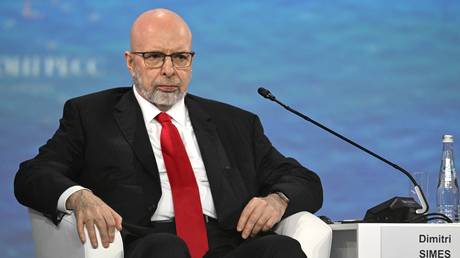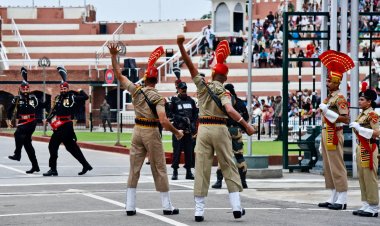‘Biden is out to get me’: Russian-American TV host facing 60-year US jail sentence speaks out
Veteran Russian-American political analyst Dmitry Simes is confronting potential imprisonment of up to 60 years due to charges filed against him by U.S. authorities.

Simes was born in Moscow but moved to the United States in 1973 after leaving the Soviet Union at the age of 26 due to conflicts with the Brezhnev administration over the USSR's role in the Vietnam War. In the US, he embarked on an academic career, notably serving at Johns Hopkins University and later at the University of California at Berkeley, among others. He went on to lead the Center for the National Interest, a significant think tank aligned with the Republican Party.
In 2013, Simes was recognized by Carnegie as a "Great Immigrant and Great American." He departed his role at the National Interest in 2022 and returned to Moscow where he currently hosts the show 'The Great Game' on Russia’s Channel One. These recent charges against him stem from alleged financial activities connected with his work for the channel.
In an interview with Elena Chernenko from Kommersant, Simes responded to the DOJ's claims, sharply criticizing the US authorities and denying any wrongdoing related to his financial arrangements or his journalistic work, which he argues falls under the protections guaranteed by the First Amendment of the US Constitution.
Simes expressed his disbelief and frustration over the allegations, particularly highlighting the accusation of money laundering which he believes is unfounded and politically motivated. He explains that his financial transactions were lawful, intended for fulfilling tax obligations, and conducted through appropriate banking channels despite complications arising from US sanctions.
He also refuted claims that his work at Channel One violated US sanctions, framing the sanctions as vaguely defined and emphasizing that he had been informed by both US officials and his own inquiries that his journalistic activities were not in violation of any sanctions. Despite these reassurances, Simes faces serious charges that could have substantial legal consequences.
Further, Simes questioned the broader motivations behind the charges, suggesting that political forces within the US might be using his case to stir up concerns over Russian interference in American politics—a claim he strongly denies any involvement with. He also brought up an incident involving a search of his property in the US, questioning the conduct and implications of such actions by US authorities.
Amidst these challenges, Simes has voiced his intentions to defend himself vigorously, while criticizing the current US administration for their handling of not only his case but broader diplomatic tensions. He remains skeptical of receiving a fair trial in the US, influenced by what he perceives as a hostile political environment against those who challenge the prevailing narrative.In the course of the interview, Simes reflected on his past experiences, drawing a parallel between his current situation and his earlier life in the Soviet Union, where dissent was met with persecution. He acknowledged that he faced far less severe consequences than he might now in the U.S. legal system, yet the psychological toll and sense of injustice resonate with memories from his earlier days of dissent.
When discussing the impact of his work at Channel One, Simes asserted that he has always been transparent in his role and has not shied away from expressing dissenting views, even in the presence of Russian leadership. He emphasized that his appearances on air promote open dialogue rather than mere propaganda for the Kremlin.
Simes also lamented over the current climate of political correctness in the United States, suggesting that it stifles open conversation about contentious issues, particularly regarding Russia. He pointed out that even well-regarded figures in the U.S., such as the economist Jeffrey Sachs, have faced isolation or ostracism for deviating from mainstream American narratives regarding Russia.
On the question of potential allies or support within the U.S. media landscape, Simes noted the striking silence among his colleagues in America regarding his legal troubles. He remarked that this silence reflects a broader climate of fear and conformity that exists among those in the media, where any deviation from the accepted narrative could attract scrutiny or backlash.
Delving further into international relations, Simes expressed concern over the deteriorating ties between Russia and the U.S. He pointed out that during earlier diplomatic engagements, particularly in the early 2000s after the 9/11 attacks, there was a greater willingness on the part of Russian leadership to cooperate with American initiatives. This cooperation, however, has diminished over the years as perceptions of American policies shifted, particularly in response to NATO’s expansion and U.S. military actions abroad.
Simes attributed the current state of affairs to a series of miscalculations and misunderstandings on both sides, with a specific emphasis on the American "deep state" he believes is resistant to positive engagement with Russia. He argued that this entrenched mindset has complicated diplomatic relations and has fueled a narrative of hostility that he argues is no longer reflective of the geopolitical realities.
As he concluded the discussion, Simes remained resolute in his intentions to combat the allegations against him. He conveyed a sense of responsibility to challenge the administration’s actions and to advocate for a more open discourse regarding U.S.-Russia relations. He also called attention to the role of independent thinkers and journalists in both countries, suggesting that their voices are crucial for fostering understanding and mitigating conflict.
Overall, Simes' position embodies a complex intersection of personal narrative and broader political dynamics, illustrating how individual cases can reflect and impact the state of international relations. His ongoing legal battles not only represent a significant chapter in his life but also serve as a microcosm of the increasingly fraught relations between two nuclear powers. As he navigates these tumultuous waters, Simes continues to advocate for what he considers fundamental rights to freedom of expression and the need for a reevaluation of the current geopolitical landscape.
Jessica Kline for TROIB News












